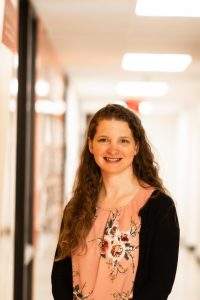With an ever-changing climate, communities everywhere seem to be impacted by climate change, whether natural disasters, food shortages, atmospheric changes or other issues.

In Alaska, the Yukon Kuskokwim Delta native community is experiencing extreme damages due to climate change. The Yukon Kuskokwim Delta village is located inland, away from the coast. But with many rivers running throughout the land, floods are becoming more and more common, damaging infrastructure built near rivers. With rising floodwaters, buildings located near the river are slowly eroding and being torn into the river waters.
Department of Civil, Construction and Environmental Engineering (CCEE) professor and researcher Cassie Rutherford recently received a planning grant from the National Science Foundation for $300,000 through the ‘Navigating the New Arctic’ project to work with communities, stakeholders and government officials to find ways to adapt to the ever-changing environment to help communities battle climate change.
“Due to changing climate, there’s been sooner ice melt and larger storms, so these things have caused the rivers to flood more often and carry larger debris, causing erosion. Permafrost is melting, so there is more erosion from that,” Rutherford said. “So communities that have based their houses or infrastructure around the rivers are actually starting to lose some of their infrastructure into the river.”
Without adaptive strategies, the community could lose their homes, airports or infrastructure.
“A lot of the local villagers use the river for collecting fish, for transportation, and they park their boats in locations that have boat landings,” Rutherford said. “But as those erode away, they might not have the option to park their boats there.”
Working together with the community, local high schools and community members are gathering data in Alaska while the team is in Iowa. The community members are taking photos of the rivers as time goes on to measure how high the waters are and other pieces of information.
“A lot of these rivers are ungauged, there’s no data for them – so we need to collect that information,” Rutherford said. “There’s no weather stations, so we don’t know what the precipitation is, what the temperature is and things like that. Where they live is inland, so there hasn’t been as much research on it.”
This grant, called ‘Community-based Mitigation and Adaptive Strategies for River Flooding and Erosion in Alaska Native Communities,’ is different from the typical grant that researchers have, where they are investigating and solving an issue. Instead, the team is learning how the community can adapt to the situation, and develop methods to protect their infrastructure.
“Our goal is to work with communities to determine what their priorities are and help them come up with a strategy and predict how long they have, what items they should be moving, and things like that,” Rutherford said.
Rutherford and her team, including Dr. Cristina Poleacovschi (CCEE) and Dr. Kristie Franz (Department of Geological and Atmospheric Sciences), are organizing a workshop in Bethel, Alaska in August to meet with community members, look at the pictures of the river and listen to their stories. They are also meeting with high school students to give them the chance to record the history of the river by interviewing their elders.
“Things are changing drastically, and I think that the only way that engineers can help with that is to adapt and help communities make plans for when there could be disasters,” Rutherford said. “We can’t prevent all disasters, but we can create strategies to prepare for rebuilding as well as protecting them to the best of our abilities.”
